Periodontal disease, better known as gum disease, is one of the two most common oral health concerns. Unfortunately, patients often go undiagnosed until this health condition advances to the most severe stage. At Ultimate Dental, we focus our personalized dental care plans on preventive dentistry. When you visit our office for six month checkups, we’ll screen for the warning signs of periodontal disease, and partner with you to maintain at-home hygiene plans to prevent advanced gum disease. If you’re not already maintaining biannual dental checkups with our team, we encourage you to start visiting us at least twice a year. If you do have periodontal disease, we offer periodontal therapy to renew oral health and put the smile back on your face. Give our team a call to learn more or schedule a screening for periodontal disease in our Brownstown dental practice. Dr. Hadad and the Ultimate Dental team offers a variety of periodontal therapies to achieve and maintain your healthiest smile following gum disease.
Periodontal (Gum) Disease Treatment – Brownstown
Protecting Oral & Overall Health at the Same Time
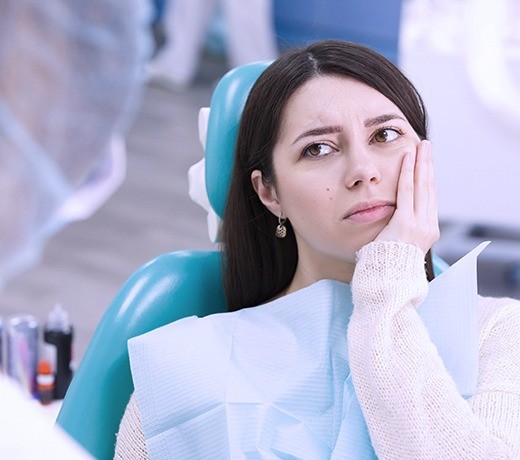
Why Choose Ultimate Dental for Periodontal (Gum) Disease Treatment?
- Gum screenings performed at every checkup
- Soft tissue laser provides precise & painless gum treatment
- Deep cleanings eliminate infections at the source
What is Periodontal Disease?
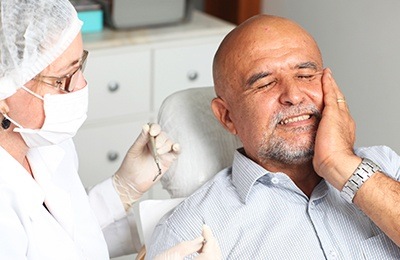
The definition of periodontal disease may be best explained by breaking down the meaning of the word “periodontal.” It’s actually a compound word that combines “perio” meaning around and “odont” meaning tooth. Thus, periodontal disease, often referred to as gum disease, is an oral health condition that affects the tissues around the teeth. It occurs when plaque and tartar buildup around the gum line irritates soft tissue, causing sores and breaking down connective tissue between teeth and gums.
How do I Know I Have Gum Disease?
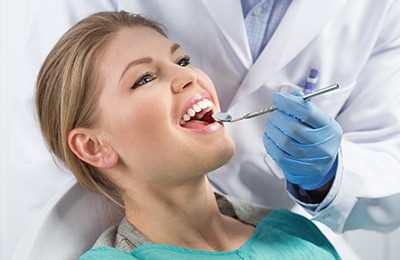
During your biannual dental exams, we will screen for this common oral health condition, but you should also call us right away if you notice any of the following warning signs of gum disease:
- Bleeding gums
- Swollen, inflamed, or infected gums
- Discolored gums
- Sores in the soft tissue that do not heal
- Teeth that look longer or gums that are recessing
- Teeth that feel lose or a bite that doesn’t fit together
- Chronic bad breath that doesn’t improve after cleaning
What Periodontal Therapies are Available?
We offer a variety of periodontal therapies. In the early stages of gum disease, gingivitis, more frequent professional cleanings and improved at-home hygiene may be adequate to fully renew oral health. In cases of more severe periodontal disease, periodontitis, we may need to combine improved in-office and at-home hygiene routines with more advanced treatments, including:
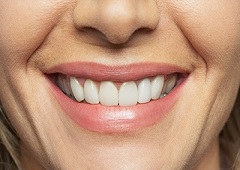
Scaling –
The removal of plaque and tartar buildup and damaged tissue around and below the gum line
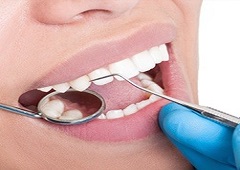
Root planing –
Smoothing of tooth roots to prevent further plaque and tartar buildup
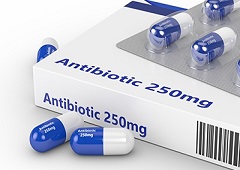
Antibiotic therapy –
Oral and/or topical antibiotics may be used to reduce the numbers of plaque producing oral bacteria
How do I Prevent Gum Disease?
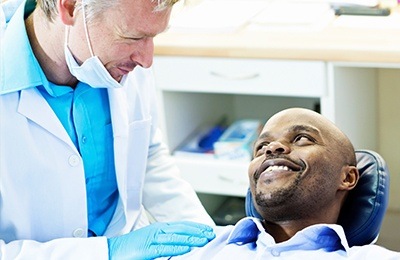
Brushing and flossing every day and visiting our office at least two times each year are essential to prevent gum disease. Many of our patients skip flossing or floss irregularly. If you’re one of these patients, starting a consistent flossing routine should be your first step. If you already brush teeth twice a day and floss at least daily, visit our office every six months for checkups and screenings. During these biannual dental exams, we perform periodontal charting. Because one of the first signs of gum disease is the recession of gums and increase in the depth of the pockets between teeth and gums, we keep track of the depth of your periodontal pockets, and when we notice changes, we can take action right away to stop periodontal disease in its tracks. If you have diabetes, are an expectant mother, suffer from dry mouth, or are otherwise considered at high risk for gum disease, we may recommend using a prescription antimicrobial mouth rinse to reduce the numbers of plaque-producing oral bacteria and decrease your risk for gum disease.
